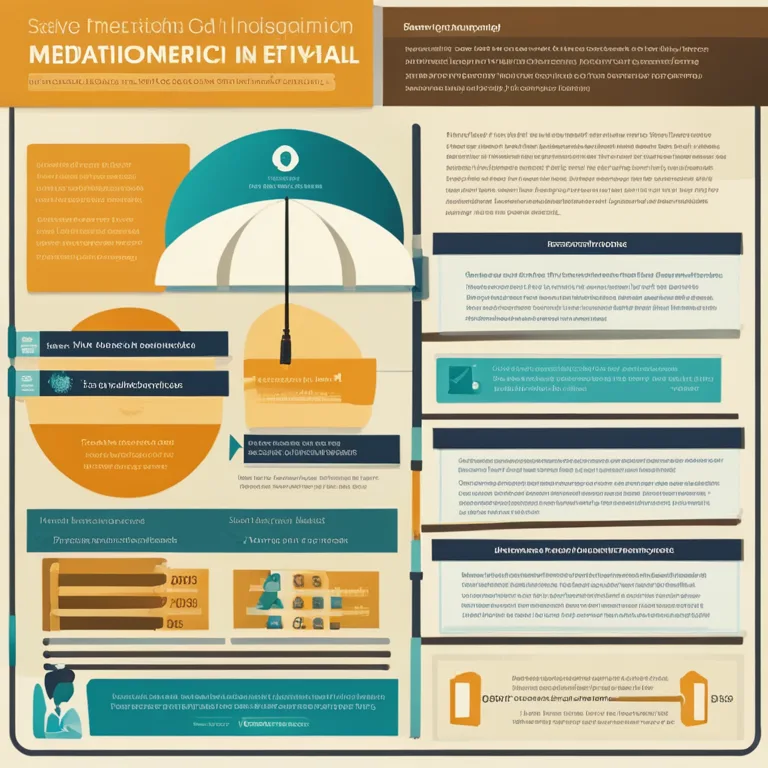
Meditation as a Balm for Depression?
A deep dive into how the age-old practice of meditation might be effective in easing symptoms of depression and enhancing mental health.
article by Hina Kurosawa
The Plight of Depression
In an era where mental health is garnering as much importance as physical health, depression remains a formidable challenge affecting millions worldwide. Characterized by persistent sadness, lack of interest, and a myriad of other symptoms, depression can significantly impair daily functioning. Traditional treatment protocols encompass a combination of therapy and medication. However, as we expand our horizon in coping strategies, meditation emerges as a potential supplementary treatment. Recent studies have signaled the effectiveness of mindfulness and meditation practices in mitigating depressive symptoms, albeit being adjunct to conventional treatments.

Meditation: Ancient Practice, Modern Application
Meditation, a practice with roots in various ancient traditions, has found its place in contemporary therapeutic settings. Much more than a spiritual exercise, meditation has been the subject of scientific scrutiny, which now backs its mental health benefits with robust evidence. In the age of digital distractions and unabating stress, meditation provides a much-needed refuge by promoting relaxation, enhancing self-awareness, and fostering a sense of inner peace. By routinely engaging in meditation, individuals may experience decreased levels of stress hormones, such as cortisol, which are often elevated in those suffering from depression.

Mindfulness and Neuroplasticity
The concept of neuroplasticity, or the brain's ability to reorganize itself, is central to understanding how meditation can support mental health. Mindfulness meditation, a practice focusing on the present moment without judgment, has been shown to promote changes in brain regions associated with mood regulation. Studies indicate that mindfulness practices can boost activity in the prefrontal cortex and enhance connectivity between brain regions, countering some of the neurological patterns observed in depression. As individuals become more adept at managing thought patterns, they may experience a reduction in depressive episodes.

Empirical Evidence and Clinical Studies
Clinical trials have increasingly included meditation as a variable in depression research, often yielding promising results. For example, a meta-analysis of numerous studies found that mindfulness-based cognitive therapy (MBCT) — which combines mindfulness techniques with traditional cognitive behavioral therapy — can significantly lower the risk of relapse in individuals with recurrent depression. Furthermore, these techniques are notably beneficial in managing stress, which can be a precipitating factor for depressive symptoms. It’s important to note, however, that meditation is not a standalone cure but a complementary tool in a holistic approach to mental health care.

Integrating Meditation Into Daily Life
One of the most appealing aspects of meditation is its accessibility and versatility. It requires no special equipment and can be practiced in various forms, including guided meditation, mantra meditation, or simple breathing exercises. Accessibility is crucial since persistent engagement is key to experiencing the full spectrum of benefits. Mental health professionals increasingly emphasize incorporating meditation into daily routines as a preventative measure and a way to maintain mental well-being, not just to treat symptoms once they appear.
Limitations and Considerations
While meditation is a low-risk intervention, it's crucial to recognize its limitations and not overstate its benefits. Not everyone responds to meditation in the same way, and for some, it might not be as effective. Additionally, individuals with severe depression should always consult a healthcare professional before starting any new treatment regimen, including meditation. Ultimately, meditation offers a supportive role and should complement, not replace, professional medical advice and treatment.
Published: 1/8/2024
Modified: 1/8/2024
More predictions
Come back here soon to learn more about yourself and your future


Finger Meditation Techniques
Discover the power of finger meditation to harmonize your body and mind, enhancing wellness and inner peace.


Meditation Techniques: A Handbook
Discover the breadth of meditation methods to enhance your wellness journey.


Jain Meditation Techniques for Inner Peace
Discover the serenity and spiritual depth of Jain meditation practices in a comprehensive article tailored for modern seekers.